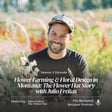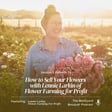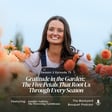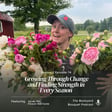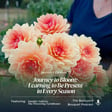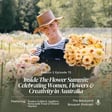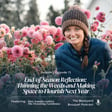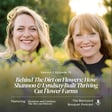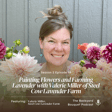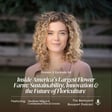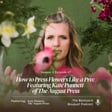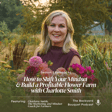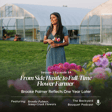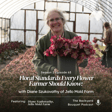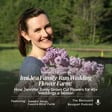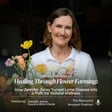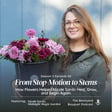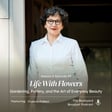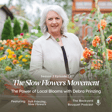
Ep. 35: Erin Benzakein of Floret: How Seeds Hold The Past, Present, & Future
Have you ever marveled at how a tiny seed encapsulates not just life but also the past, present, and future? Dive deep into this concept with Erin Benzakein, the founder of Floret, one of the most influential flower farms and seed companies globally, on this episode of The Backyard Bouquet Podcast.
Erin's love for flowers sprouts from cherished childhood memories and blossomed into a profound passion that would redefine her life’s path. Starting with a modest garden while raising her young children, Erin's journey is a testament to how a simple backyard project can evolve into a pioneering enterprise in sustainable agriculture and floral education.
Throughout our conversation, Erin opens up about the parallel growth of her business and her children, sharing how each stage of their lives influenced her strategies and decisions. She discusses the delicate balance of motherhood and entrepreneurship, revealing her personal philosophy on taking things slowly and embracing patience.
Erin also delves into the dynamics of building a supportive team, highlighting how recognizing her own limitations allowed her to focus more on her strengths—cultivating flowers and fueling her creativity.
Join us for a truly enlightening dialogue with Erin Benzakein, filled with enduring lessons on perseverance, leadership, and the joys of flower farming. Tune in to get inspired by Erin's flowering journey and her passionate commitment to the beauty of blooms. Plus, be sure to sign up for her free Seed-Saving-Mini-Course!
Show Notes: https://thefloweringfarmhouse.com/2024/08/27/ep-35-floret/
Learn More About Floret:
- Floret https://www.floretflowers.com
- Email Sign up https://www.floretflowers.com/newsletter/
- Seed Saving Course https://workshop.floretflowers.com/2024-seed-saving-mini-course-opt-in
- Instagram https://www.instagram.com/floretflower/
- YouTube https://www.youtube.com/@floretflowerfarm
- Facebook: https://www.facebook.com/floretflowers/
- Annual Floret Workshop: https://www.floretflowers.com/workshops/online-workshop/
******
3 Types Of People Are Replacing Their Income With A Digital Course… Are You One Of Them?
Take the quiz: https://bit.ly/3typesofpeoplereplacingincomewithadigitalcourse
******
Sign up for our newsletter: https://bit.ly/thefloweringfarmhousenewsletter
***Rate, Review, & Follow The Backyard Bouquet***
If you enjoyed this episode, will you please consider leaving the podcast a review? I'd love to know what you enjoyed most about the episode.
New episodes every week to help keep your garden blooming!
